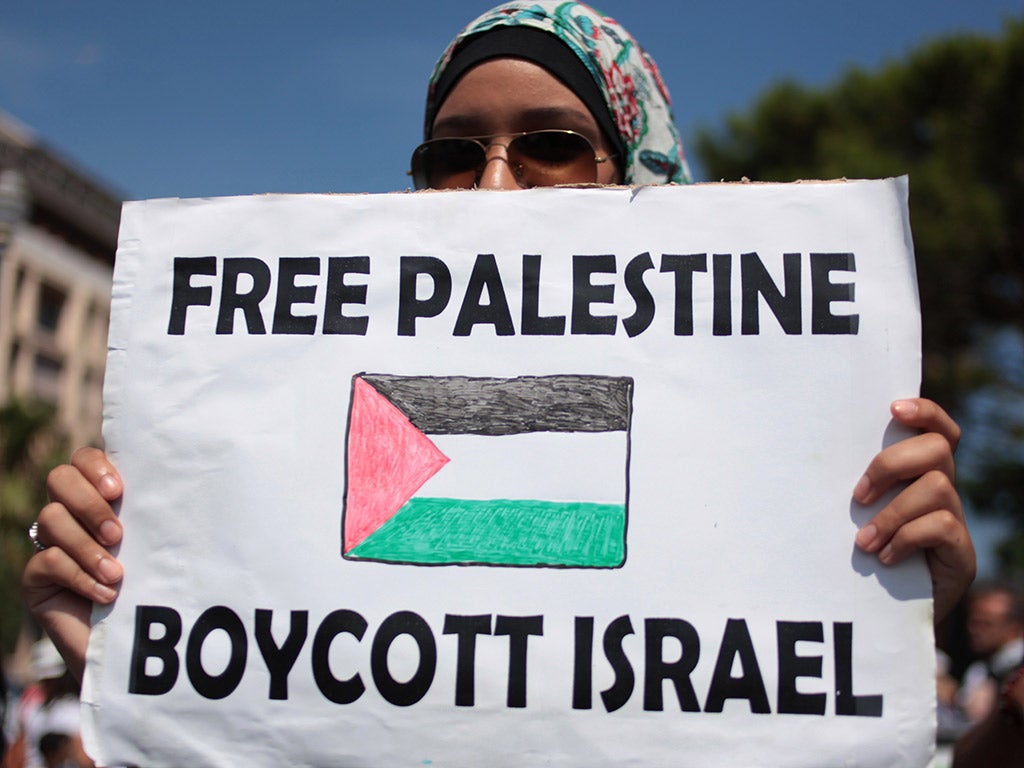Israel boycott ban: Local councils should have the right to refuse goods produced in Israeli settlements
The simplest way to discourage boycotts would be for Israel to grant Palestinians the liberation they deserve

Your support helps us to tell the story
From reproductive rights to climate change to Big Tech, The Independent is on the ground when the story is developing. Whether it's investigating the financials of Elon Musk's pro-Trump PAC or producing our latest documentary, 'The A Word', which shines a light on the American women fighting for reproductive rights, we know how important it is to parse out the facts from the messaging.
At such a critical moment in US history, we need reporters on the ground. Your donation allows us to keep sending journalists to speak to both sides of the story.
The Independent is trusted by Americans across the entire political spectrum. And unlike many other quality news outlets, we choose not to lock Americans out of our reporting and analysis with paywalls. We believe quality journalism should be available to everyone, paid for by those who can afford it.
Your support makes all the difference.Soon, it will no longer be possible for local councils to boycott goods sold by Israeli companies operating in the Occupied Territories. The Government has decided that boycotts of Israeli products “threaten community cohesion” and undermine “international security”. It is a lily-livered, misguided policy – one that undermines the supposed agenda of local democracy, and demonstrates an unbecoming and counterproductive streak of censorship. The Independent has published a letter from a mixed coalition of objectors. Let us outline our own reasoning.
The Government is not wrong to be concerned about rising levels of anti-Semitism in the UK. And though it was a seedy exaggeration for ministers to claim that “militant left-wing councils spurred on by the Labour leadership” are pursuing dangerously divisive (and by implication anti-Semitic) policies, it would be equally wrong to deny that a proportion of the pro-Palestinian left still harbours appalling attitudes towards Jewish people. Among all supporters of the Palestinian cause, it is beyond time to move from statements of “zero tolerance” to actively highlighting and expelling anti-Semites: Jeremy Corbyn does indeed have work to do in this regard. A broad church approach is worth nothing if one corner is filled with Holocaust-deniers and hate-mongers.
Yet, for its part, the Government perniciously conflates all forms of anti-Israel protest. Distinctions are vital to maintain. This newspaper opposes all academic boycotts of Israel: such projects shut down debate and foster intolerance. They also fall into the same trap as the Boycott Divestment and Sanctions (BDS) movement, in its more juvenile forms, in failing to distinguish between the legitimate state of Israel and its illegal activities in the Occupied Territories. All protesting energies should be directed here, to use what leverage the international community has to discourage the building and maintenance of settlements on Palestinian land, as well as the cavalcade of abuses that occur on the other side of the Green Line.
This is the form of protest that local councils had chosen to pursue. In 2014, Leicester City Council passed a boycott of all goods produced in illegal settlements in the West Bank. Many others apply pressure with the same kind of needle. These are not the actions of “militant” organisations: in fact, they match the attitude of the European Union, which similarly targets its protests – and, following Prime Minister Benjamin Netanyahu’s dismissal of the two-state solution last year, toughened its line, requiring goods produced in settlements to be labelled as such.
It is worth noting that a provision passed by Congress last year requires the US trade representative to discourage European nations from boycotting “Israel… or persons doing business in Israeli-controlled territory”, as part of EU-US free-trade negotiations. The British Government’s boycott ban could thus be understood as an attempt to keep the flames of the special relationship burning, besides winning favour with the Netanyahu government. (The policy was announced, unsurprisingly, on a trade visit to Israel.)
Whether US pressure had any bearing on the decision or not, it represents a craven betrayal of the Palestinian people. Silencing legitimate protest at illegitimate government actions marks a low ebb for British foreign policy, in so far as it is claimed to be morally upstanding. Boycotts helped to mobilise opinion against the apartheid regime of South Africa. They have a proud history. Local councils should be allowed to apply them against companies working in the Occupied Territories.
The simplest thing the Israeli government could do to discourage boycotts would be to grant Palestinians the liberation and sovereignty they deserve.
Join our commenting forum
Join thought-provoking conversations, follow other Independent readers and see their replies
Comments